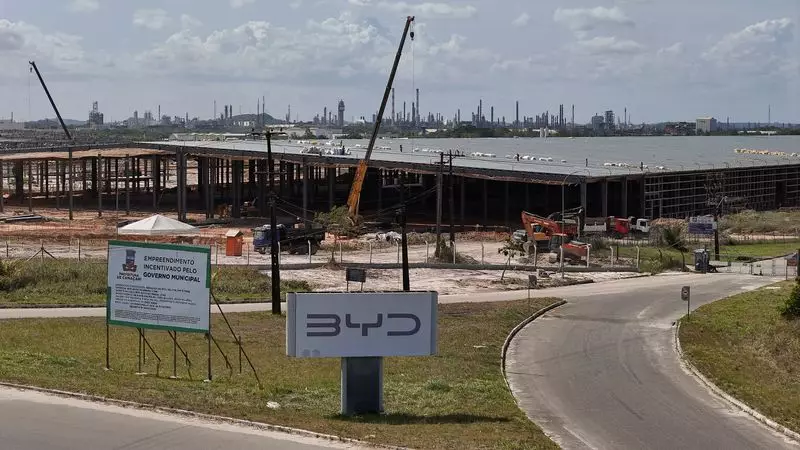The Chinese electric vehicle manufacturer BYD (SZ:002594) has recently been embroiled in a controversy regarding its labor practices in Brazil. Recent investigations have raised serious concerns about the treatment of Chinese workers brought to the country under dubious circumstances to construct a new manufacturing facility. The implications of these revelations extend beyond just labor rights; they touch upon diplomatic relations between China and Brazil and question the ethical foundations of foreign investments.
According to Brazilian labor inspector Liane Durao, a total of 163 workers employed by BYD’s contractor, Jinjiang, were found to have been subjected to conditions reminiscent of forced labor. This alarming discovery came to light in December, when Brazilian authorities intervened to rescue these individuals who were working under what has been described as “slavery-like conditions.” The Brazilian government has since reacted by suspending temporary visa issuance to BYD, indicating the severity of the situation.
In this context, the details emerging from the investigation highlight a troubling reality: many of these workers had their passports confiscated and were operating under conditions that deprived them of fundamental human rights. Labor inspectors like Durao are now tasked with ensuring that both existing and future workers at the facility are treated fairly, adhering to Brazilian labor laws. The nuance here cannot be understated; the rights of workers must be protected not only to uphold human dignity but also to maintain Brazil’s reputation as a destination for foreign investment.
BYD’s Position and Response
Faced with mounting criticism, BYD has stated its commitment to rectify the labor issues at its Brazil facility. The company asserts that it has severed ties with Jinjiang and claims that all imported workers were issued valid visas. However, Jinjiang has disputed these allegations, creating a complex web of accountability. This situation reveals a deeper systemic issue within foreign contractor models, where companies like BYD seek to reduce operational costs at the potential expense of labor rights. The challenge lies in ensuring that such companies do not exploit gaps in local labor laws.
Furthermore, the Brazilian government has signaled that BYD will face fines for each worker found in violation of labor practices, although the total amount remains unspecified. These fines serve as both punitive measures and a deterring signal to other foreign investors who might contemplate similar labor practices. With BYD investing $620 million in the Bahia facility, the repercussions for its operations could be significant, potentially delaying the anticipated production of 150,000 cars, which would provide a pivotal boost to the Brazilian automotive market.
The Bigger Picture: Foreign Investment and Labor Rights
This controversy springs from a larger narrative around foreign investment in emerging markets like Brazil. As countries strive to attract international capital, the balance between encouraging investments and safeguarding local labor standards becomes increasingly delicate. President Luiz Inácio Lula da Silva’s administration has made local job creation a priority, and the influx of Chinese workers employed to realize foreign projects stands in stark contrast to this goal.
The advance of Chinese companies in Latin America, notably through mechanisms that favor bringing their own labor force, generates profound implications. On one hand, these investments bolster economic growth; on the other, they potentially disregard the very populace that could benefit from job opportunities. As BYD scales its operations in Brazil, the labor violations uncovered might strain bilateral ties that have seen a push towards greater Chinese investment in the region.
As investigations continue, Brazilian labor authorities have vowed to maintain close oversight of BYD’s construction site. The goal is clear: ensure that the rights of domestic and foreign workers alike are respected. There is a poignant urgency to these efforts, as the fishing net cast over this investigation has implications for not only BYD’s operations but also for the broader landscape of global labor practices.
By confronting these challenges head-on, Brazil has a unique opportunity to reinforce its labor laws while sending a message to international businesses that exploitative practices will not be tolerated. This narrative will be vital not just for BYD, but for the future of foreign investments in Brazil, as the country navigates its path towards responsible economic growth amid an intricate global tapestry of labor dynamics.

